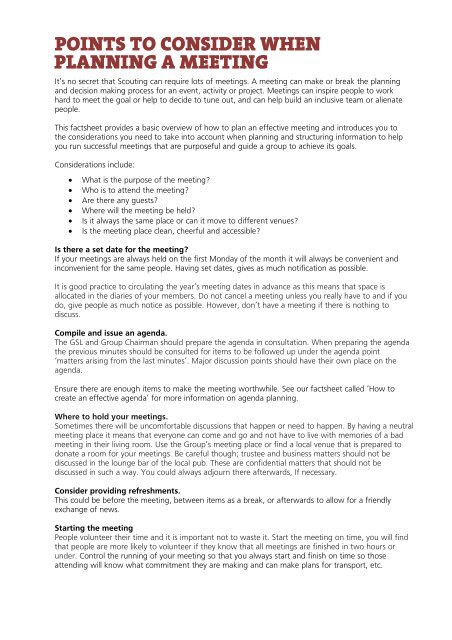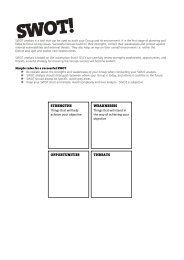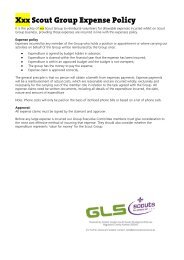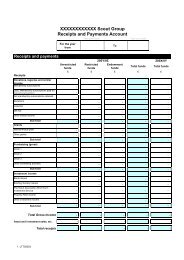POINTS TO CONSIDER WHEN PLANNING A MEETING
POINTS TO CONSIDER WHEN PLANNING A MEETING
POINTS TO CONSIDER WHEN PLANNING A MEETING
You also want an ePaper? Increase the reach of your titles
YUMPU automatically turns print PDFs into web optimized ePapers that Google loves.
<strong>POINTS</strong> <strong>TO</strong> <strong>CONSIDER</strong> <strong>WHEN</strong><br />
<strong>PLANNING</strong> A <strong>MEETING</strong><br />
It’s no secret that Scouting can require lots of meetings. A meeting can make or break the planning<br />
and decision making process for an event, activity or project. Meetings can inspire people to work<br />
hard to meet the goal or help to decide to tune out, and can help build an inclusive team or alienate<br />
people.<br />
This factsheet provides a basic overview of how to plan an effective meeting and introduces you to<br />
the considerations you need to take into account when planning and structuring information to help<br />
you run successful meetings that are purposeful and guide a group to achieve its goals.<br />
Considerations include:<br />
• What is the purpose of the meeting?<br />
• Who is to attend the meeting?<br />
• Are there any guests?<br />
• Where will the meeting be held?<br />
• Is it always the same place or can it move to different venues?<br />
• Is the meeting place clean, cheerful and accessible?<br />
Is there a set date for the meeting?<br />
If your meetings are always held on the first Monday of the month it will always be convenient and<br />
inconvenient for the same people. Having set dates, gives as much notification as possible.<br />
It is good practice to circulating the year’s meeting dates in advance as this means that space is<br />
allocated in the diaries of your members. Do not cancel a meeting unless you really have to and if you<br />
do, give people as much notice as possible. However, don’t have a meeting if there is nothing to<br />
discuss.<br />
Compile and issue an agenda.<br />
The GSL and Group Chairman should prepare the agenda in consultation. When preparing the agenda<br />
the previous minutes should be consulted for items to be followed up under the agenda point<br />
‘matters arising from the last minutes’. Major discussion points should have their own place on the<br />
agenda.<br />
Ensure there are enough items to make the meeting worthwhile. See our factsheet called ‘How to<br />
create an effective agenda’ for more information on agenda planning.<br />
Where to hold your meetings.<br />
Sometimes there will be uncomfortable discussions that happen or need to happen. By having a neutral<br />
meeting place it means that everyone can come and go and not have to live with memories of a bad<br />
meeting in their living room. Use the Group’s meeting place or find a local venue that is prepared to<br />
donate a room for your meetings. Be careful though; trustee and business matters should not be<br />
discussed in the lounge bar of the local pub. These are confidential matters that should not be<br />
discussed in such a way. You could always adjourn there afterwards, If necessary.<br />
Consider providing refreshments.<br />
This could be before the meeting, between items as a break, or afterwards to allow for a friendly<br />
exchange of news.<br />
Starting the meeting<br />
People volunteer their time and it is important not to waste it. Start the meeting on time, you will find<br />
that people are more likely to volunteer if they know that all meetings are finished in two hours or<br />
under. Control the running of your meeting so that you always start and finish on time so those<br />
attending will know what commitment they are making and can make plans for transport, etc.
FORMAT OF A <strong>MEETING</strong><br />
Open (or close) with a reading or prayer.<br />
Apologies for absence. Keep a note of attendance so those not present can be updated later. (Is it<br />
always the same people who do not come? If so, why?)<br />
Minutes of the previous meeting. Circulate these in advance so people have a chance to read<br />
them. (A ‘Minute Secretary’ could take minutes during the meeting.)<br />
Matters arising. An opportunity to follow up on any item or questions that were asked at the<br />
previous meeting. (But not to have the discussion again!)<br />
District/County. There may be information to be passed on from the District or County.<br />
Consultation. Any items which require feedback or views from the District. In turn, you can pass on<br />
the responses to the County.<br />
Future events. Not to plan in detail but to suggest ideas, put dates in diaries, select a sub-Committee<br />
or responsible Group or person, hear progress reports and review previous events.<br />
Training. Meetings are ideal opportunities to introduce a regular element of training. The topic will<br />
depend on those attending but make sure it is relevant and fun for all, otherwise it will be seen as<br />
boring or irrelevant.<br />
Any other business. Items not placed on the agenda before the meeting.<br />
Date, time and venue of next meeting.








